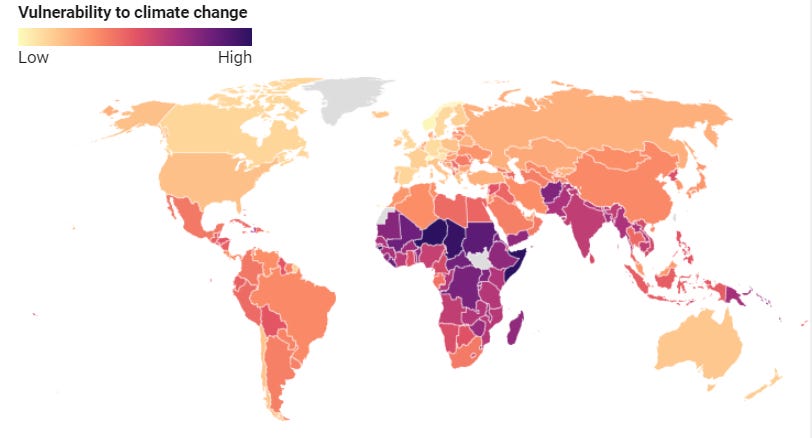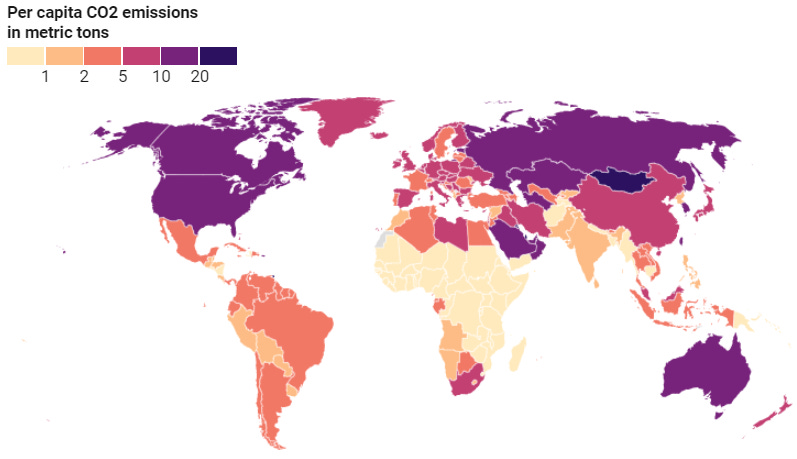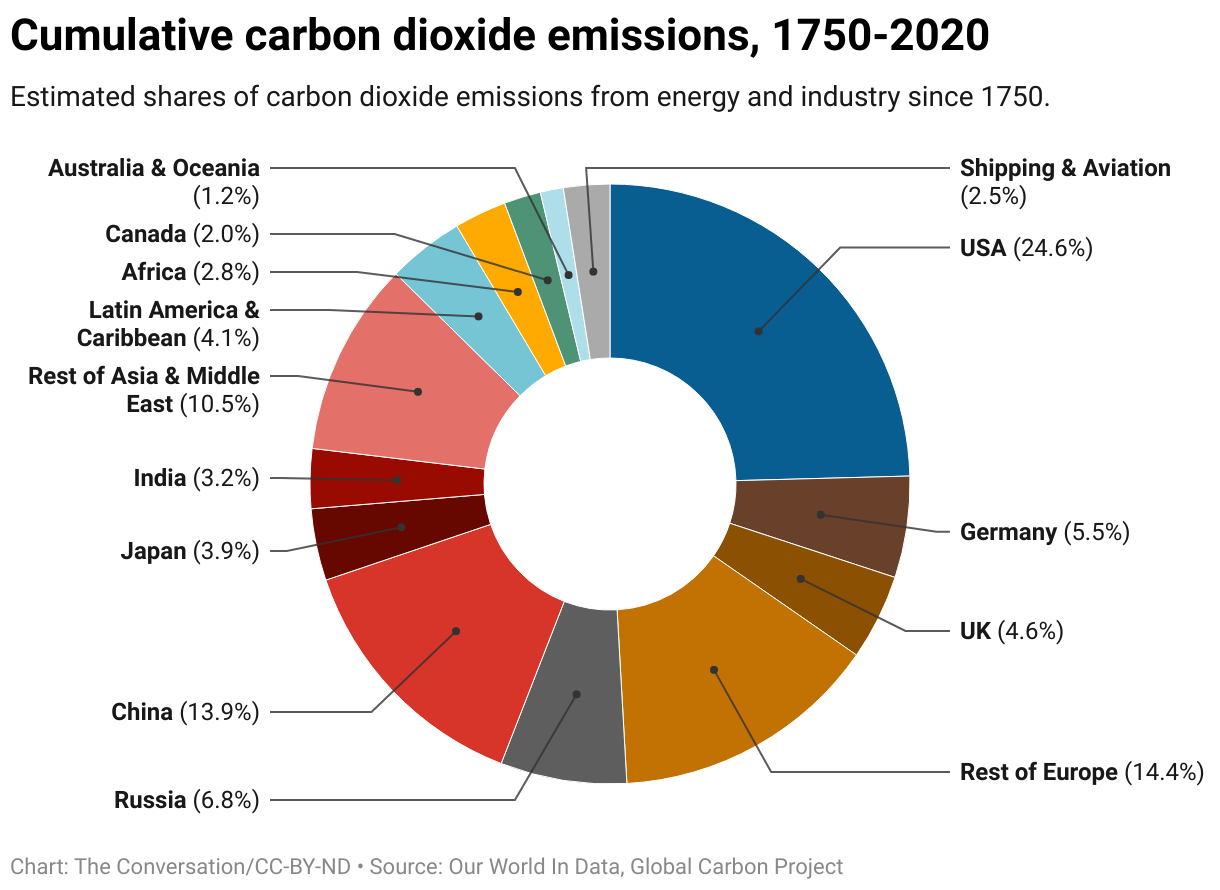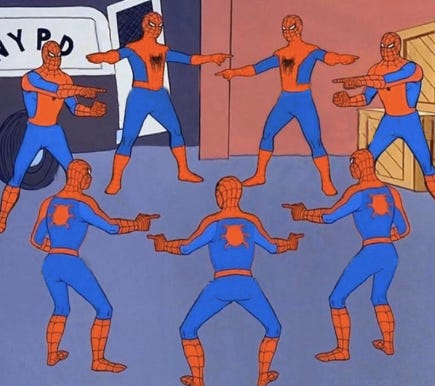Climate Karma
A narrative on the ‘karma’ in climate change & exporting loss & damage.
We’ve all heard about Karma, that ‘what goes around, comes around’. Karma denotes the cycle of cause and effect. It’s only fair to deal with the consequences of one’s actions instead of others having to deal with them.
But in the context of climate change, it’s simply not true. As a country, if I’m a major emitter of greenhouse gases, it doesn’t mean that my country will necessarily experience most of the climate change catastrophes. Countries export much of the harm created by their greenhouse gas emissions because the Earth’s atmosphere intermixes globally.
‘The inherent nature of climate change is transboundary.’
I’m going to start by showing you a couple of world maps. I want you to notice how the lowest per capita emitters are the most vulnerable to climate change.

So now, what do we mean by ‘vulnerable’? Vulnerability to climate change has two aspects:
Is your country at risk of floods, storms, heatwaves, droughts, sea level rise and all the other nasty things climate change can throw at you?
And does your country have the money, experience and government capability to deal with these disasters?
Some countries, like Australia and the USA, are geographically vulnerable to fires, heatwaves and droughts but have the money to deal with them. Others, like Pakistan or Niger, experience the impacts of climate change but are not equipped to handle these events.
Now I’d like to throw some numbers at you at this point:
The richest countries represent only 16% of the world population but almost 40% of CO2 emissions.
The top 10 countries particularly vulnerable to climate change, collectively contribute just 0.28% of global CO2 emissions while making up 5.16% of the world’s population.
In total, humans have pumped around 2,500bn tonnes of CO2 (GtCO2) into the atmosphere since 1850, leaving less than 500GtCO2 of the remaining carbon budget to stay below 1.5C of warming.
20 of the 36 highest emitting countries are among the least vulnerable to negative impacts of future climate change. Conversely, 11 of the 17 countries with low or moderate GHG emissions, are acutely vulnerable to the negative impacts of climate change.
This cross-country inequality is rooted in history: the contribution of the developed economies to global warming is greater than their share of current emissions because they have added to the accumulation of greenhouse gases in the atmosphere for a longer period.
Vulnerability’s Curse:
Climate Gentrification, Climate Refugees, Climate Migrants and Climate Debt are terms you’ll hear increasingly going forward.
In 2022, the number of forcibly displaced people exceeded 100 million for the first time, with climate change displacing more people than conflicts. Models show that for every degree of temperature rise, a billion people will be displaced.
‘Climate change displaced more people than conflicts in 2022’
Poor nations are locked in an endless loop: they must borrow money to ward off rising seas and storms — only to see disasters made worse by climate change destroy their improvements. But the debt remains, and often countries are left to borrow once again.
Blame Games, Unaccountability & Climate Injustices
Who is responsible for loss and damage?
Who bears responsibility for loss and damage is a question right at the heart of debates surrounding the issue.
If someone dies in a flood in Pakistan, which was made more likely by human-caused climate change, who is to blame? Is it countries with the highest greenhouse gas emissions? Wealthy nations that got rich by burning fossil fuels? Wealthy individuals? Or fossil fuel companies themselves?
During the United Nations climate summit in 2009 in Copenhagen, developed countries promised to channel $100 billion per year to developing countries by 2020 to help them confront climate change, but the promise was not fulfilled, making it an example of how developing countries failed to act.
To put this number of $100 billion into perspective, countries spent over $697.2 billion on fossil fuels in 2021, double of the $362.4 billion in 2020. On the upper limit, developed countries mobilised $83.3 billion in 2020 and on the lower limit, $44.6 billion was mobilised in 2015.
The US and other developed nations have long sought to avoid provisions that could open them up to legal liability and lawsuits from other countries. And in previous public remarks, US Climate Envoy John Kerry had said loss and damage were not the same things as climate reparations. Some countries feared that admitting responsibility for their share of heat-trapping pollution would expose them to paying developing nations every time a disaster hit.
The Vanuatu Case and what it could mean for Global Climate Accountability
The small Pacific island of Vanuatu was hit by two Category 4 cyclones and has been dealing with devastating tropical cyclones, flooding, biodiversity loss and sea level rise recently.
Vanuatu contributes less than 0.0018 per cent of global greenhouse gas emissions. It sinks more carbon than it emits and is already a “carbon-negative” country. Yet it is one of the most vulnerable countries to climate impacts.
The United Nations has adopted a landmark resolution asking the International Court of Justice (ICJ) to deliver an opinion on climate change and the legal consequences countries face for harming the environment.
The resolution asks the ICJ to clarify states’ obligations regarding climate change, including their human rights obligations to reduce greenhouse gas emissions. The resolution also asks the court for guidance on questions of accountability for “states that have caused significant harm to the climate,” including for small island states, and people and individuals adversely affected by climate change.
The Path Forward:
The United Nations Climate Change Conference COP27 closed with an agreement to provide “loss and damage” funding for vulnerable countries hit hard by climate disasters. In addition to providing financial aid to vulnerable countries, we need to help these countries build resilience.
The 6th edition of the IPCC report made it explicit that we need to collectively change our ways and change them fast.
Climate Karma is untrue because climate change impacts are transboundary and unequal. Large emitters need to take responsibility and aid the countries most vulnerable to climate change because under the burden of catastrophes, economic development and debt repayment several countries are starting to cripple. And remember, it is not countries who feel the effects, it’s the people.





A lot of people overlook this when talking about Climate Change and this is a conversation we need to start having right now.
Very well researched and written!